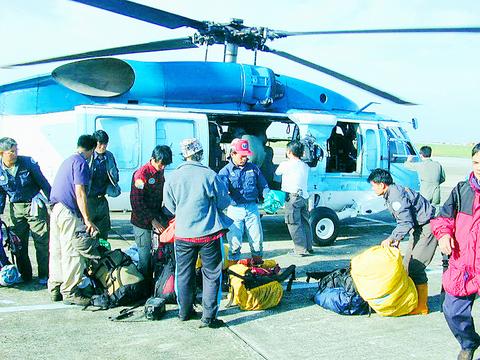After being stranded in the mountains near Hualien since Tuesday, six National Taiwan University students were transported to safety by a Sea Gull Helicopter Rescue Team early yesterday morning.
The group lost a teammate, however, who died of high-altitude sickness late Wednesday night, Chinese-language media reported yesterday.

PHOTO: WU SHIH-TSUNG, TAIPEI TIMES
Wang Shun-hung (王舜弘), 26, experiencing nausea, gradually lost consciousness on Tuesday when the group entered the Wuming (無名) mountain area, part of Hualien's Taroko Gorge (太魯閣) National Park.
Hikers become more prone to high-altitude sickness as elevation increases due to the severe lack of oxygen, which can result in loss of consciousness, circulatory or respiratory problems, and even death.
With Wang feeling ill, the teammates camped near Wuming Pond (
The helicopter rescue team attempted to reach them several times but was unable to do so due to poor weather conditions. The team faced clouds, fog, wind and torrential rain.
As the weather improved yesterday morning, a helicopter transported the students -- along with a nine-member ground-rescue team which arrived at the pond on Thursday -- to the Chiayi Veterans Hospital (嘉義榮民醫院). Medical experts examined Wang's body before sending it to his family in Tainan.
The other six students, in good health, left the hospital and took trains back to Taipei. The students refused to comment on the incident, according to the reports.

An essay competition jointly organized by a local writing society and a publisher affiliated with the Chinese Communist Party (CCP) might have contravened the Act Governing Relations Between the People of the Taiwan Area and the Mainland Area (臺灣地區與大陸地區人民關係條例), the Mainland Affairs Council (MAC) said on Thursday. “In this case, the partner organization is clearly an agency under the CCP’s Fujian Provincial Committee,” MAC Deputy Minister and spokesperson Liang Wen-chieh (梁文傑) said at a news briefing in Taipei. “It also involves bringing Taiwanese students to China with all-expenses-paid arrangements to attend award ceremonies and camps,” Liang said. Those two “characteristics” are typically sufficient

A magnitude 5.9 earthquake that struck about 33km off the coast of Hualien City was the "main shock" in a series of quakes in the area, with aftershocks expected over the next three days, the Central Weather Administration (CWA) said yesterday. Prior to the magnitude 5.9 quake shaking most of Taiwan at 6:53pm yesterday, six other earthquakes stronger than a magnitude of 4, starting with a magnitude 5.5 quake at 6:09pm, occurred in the area. CWA Seismological Center Director Wu Chien-fu (吳健富) confirmed that the quakes were all part of the same series and that the magnitude 5.5 temblor was

The brilliant blue waters, thick foliage and bucolic atmosphere on this seemingly idyllic archipelago deep in the Pacific Ocean belie the key role it now plays in a titanic geopolitical struggle. Palau is again on the front line as China, and the US and its allies prepare their forces in an intensifying contest for control over the Asia-Pacific region. The democratic nation of just 17,000 people hosts US-controlled airstrips and soon-to-be-completed radar installations that the US military describes as “critical” to monitoring vast swathes of water and airspace. It is also a key piece of the second island chain, a string of

The Central Weather Administration has issued a heat alert for southeastern Taiwan, warning of temperatures as high as 36°C today, while alerting some coastal areas of strong winds later in the day. Kaohsiung’s Neimen District (內門) and Pingtung County’s Neipu Township (內埔) are under an orange heat alert, which warns of temperatures as high as 36°C for three consecutive days, the CWA said, citing southwest winds. The heat would also extend to Tainan’s Nansi (楠西) and Yujing (玉井) districts, as well as Pingtung’s Gaoshu (高樹), Yanpu (鹽埔) and Majia (瑪家) townships, it said, forecasting highs of up to 36°C in those areas